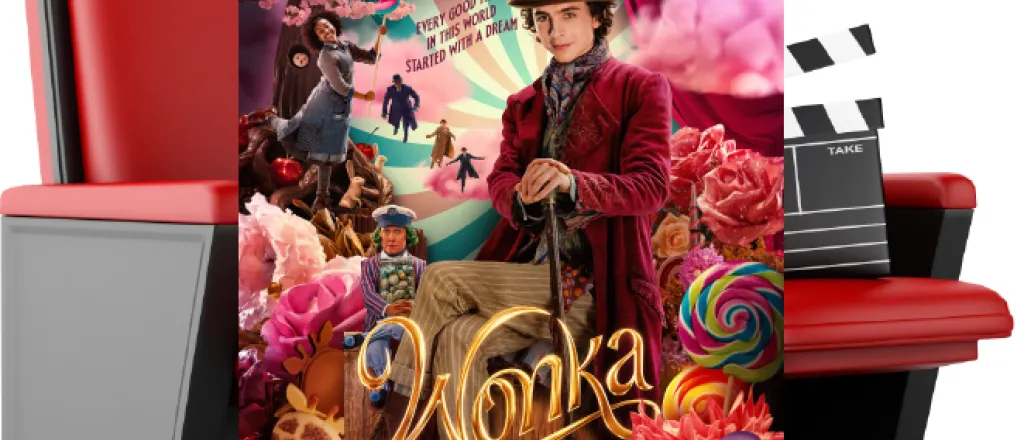
Movie Review - Wonka
©
A bit of autobiography here at the start: I grew up a stone’s throw from Hershey, Pennsylvania, and my current full-time employment comes from Hershey’s Chocolate World in Times Square. Chocolate, its production, and its sales are all a major part of my identity. So I view media related to Roald Dahl’s 1964 children’s book “Charlie and the Chocolate Factory” through a different lens than most. For example, the first time I saw 1971’s “Willy Wonka and the Chocolate Factory” at the age of six, I wondered why the whole world would lose its mind over a contest where the prize was a visit to a chocolate factory. I lived a mere ten minutes from a chocolate factory, and even at that young age, the tour had gotten boring for me. Eventually I learned that the factory of the movie was a gorgeous and twisted place, and then I was able to enjoy the ride (with the possible exception of the nightmarish actual “ride”), but it took about half the movie for my disbelief to be suspended.
All of this is to say that I went into “Wonka” with a high standard for how the chocolate would be portrayed. I wasn’t looking for accuracy, heck, I was just coming off an unreasonably crowded Saturday-in-December shift and needed a break from real chocolate. But I did need the chocolate to look good, to come off well so that people would leave the theater wanting more of it. The chocolate of the 1971 film looked absolutely scrumdiddlyumptious (a word that surprisingly passes my computer’s spell-check), but in the 2005 Tim Burton version, it looked distorted and inedible. Given those two extremes, it’s not shocking that the chocolate in “Wonka” falls somewhere in the middle, but given that it’s surrounded by an underwhelming movie, I wasn’t exactly in a hurry to return to work and use my employee discount.
The movie follows young Willy Wonka (Timothée Chalamet) as he seeks to open his first chocolate shop. Standing in his way are the “Chocolate Cartel” of no-good rivals Slugworth (Paterson Jospeh); Fickelgruber (Mathew Baynton); and Prodnose (Matt Lucas), an on-the-take police chief (Keegan-Michael Key), and his indentured servitude to a pair of laundromat owners (Tom Davis and Olivia Colman). But he has help from his fellow “scrubbers” (Jim Carter, Natasha Rothwell, Rakhee Thakhar, Rich Fulcher, and breakout Calah Lane) and the lasting wisdom of his late mother (Sally Hawkins). He’s initially antagonized by a thieving Oompa-Loompa (Hugh Grant) but we know that the two will eventually end up allies and that Wonka will bring in all of Oompa-Loompaland to work in his factory in an arrangement that future adaptations will no doubt overcompensate to make clear is not slavery.
Wonka himself is both a spectacularly great and terrible businessman. He’s pitifully naïve and bad at managing a budget, yet effortlessly charming as a salesman and knows chocolate so well that he can manufacture it seemingly by magic. The only time he ever has to worry about finding an ingredient is a sequence where he has to break into a zoo to get giraffe’s milk. And not only does the chocolate taste great, but it gives people superpowers like newfound self-confidence and the ability to fly. So yes, the chocolate comes off well, the movie has done its job there.
I can’t say “Wonka” does its job well in every department. I’m still not sold on Chalamet as a leading man, especially compared to the brilliant Gene Wilder as the 1971 Wonka. This movie is so darn sweet that it lacks the naughtiness that made that version appealing. Grant is the only one who seems to be in the right spirit, and his performance is hampered by terrible CGI. And every one of the movie’s musical numbers is overproduced dreck, even the classic “Pure Imagination” is devoid of life. That said, it’s impossible to get too mad at a movie like this, one that the family can all agree to see together during the holidays.
Grade: C
“Wonka” is rated PG for some violence, mild language and thematic elements. Its running time is 116 minutes.
Contact Bob Garver at rrg251@nyu.edu.














